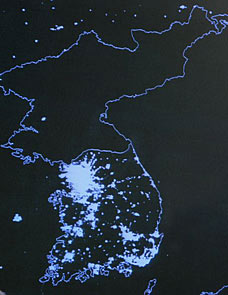The U.S. Air Force flew a WC-135 Constant Phoenix on Tuesday to collect air samples from the region.A small detonation would likely be the result of a fizzle - a failed nuclear test where the nuclear reactions fail to operate at the proper efficiencies causing a dropoff in the yield. Small nuclear devices are apparently particularly susceptible to fizzles.
A third official reiterated that at this point "there isn't information to allow confirmation it was a nuclear test."
The intelligence community and the military will continue to fly satellites and collect air samples in the region to try to collect radiological data that would provide confirmation of a nuclear test, officials said. But as time goes on, it will be increasingly difficult to achieve confirmation.
Officials emphasize this is preliminary data, and it provides no conclusive evidence about the North Korean event.
It is possible there was no radiological data. That could be the case if: the North Koreans successfully sealed the site; it was such a small detonation and so deep underground there was no escape of nuclear debris; or the test was actually conventional explosives.
Arms control monitors in Vienna, Austria, also tell CNN that they are now trying to run computer models to simulate wind conditions over the Korean Peninsula so they can try to calculate where radiological material might flow on air currents so they can position sensors for the best position to pick it up.
It is possible that the test was buried deep underground so that nuclear materials would not be ejected from the blast site. The North continues to stick by their story that they detonated a nuclear device.
Blue Crab Boulevard notes that the Chinese also have failed to find any radiation in the samples that would prove the North Koreans detonated a nuclear device. Gaius muses about the irony of L'il Kim being hit with sanctions for detonating a nuclear device that wasn't a nuclear device at all.
Keep in mind that the North Korean infrastructure is woeful by any standards, and can barely produce enough electricity to power the country 24x7. That said, most of the country's resources are directed into the military and weapons research.
Other reports seem to back up the theory of a fizzle. One such report considers this test to be a failed plutonium based device.
The latest intelligence estimates of Monday's test at a nuclear test site near Kilju, in northeastern North Korea, put the size of the blast at 0.2 kilotons, or the equivalent of 200 tons of TNT. A plutonium-fueled nuclear device normally creates a much larger blast, in the range of 5 kilotons to 20 kilotons. A kiloton is the equivalent of 1,000 tons of TNT.Others blogging: Indiescribe and Ed Morrissey (who wonders if the North is bluffing).
The detected explosion likely was produced by the conventional high-explosives used to split the plutonium atoms and produce a nuclear explosion, one official said. A second official said, "There was a yield that was in the several hundred ton range, but it at least partially failed."
UPDATE:
A Security Council vote on sanctions is expected this Saturday:
The Security Council today agreed to a Saturday vote on a resolution calling for sanctions against North Korea after negotiators eliminated an explicit mention of military enforcement that had brought objections from China and Russia.Once again, sanctions without any teeth for failure to adhere to the resolutions. Gee, that's going to really make L'il Kim shake in his boots. He's too busy working on stocking his wine cellar and munching on imported sushi to notice.
The new draft also redefined the legal limits of the inspections it calls for of cargo going into and out of North Korea and dropped a blanket embargo on conventional weapons, limiting the ban to large sized arms, military systems and weapons of mass destruction.
The measure, drafted by the United States and revised three times this week, still requires all countries to prevent the sale or transfer of material related to North Korea’s nuclear, ballistic missile and unconventional weapons programs and maintains a ban on travel by persons associated with those programs.
It also bars North Korea from exporting such weapons, a provision aimed at the international concern over the possibility of unconventional arms from North Korea ending up with terrorist groups or rogue states.
UPDATE:
Round and round we go, where it stops no one knows. A new batch of reports seems to indicate that radiation was detected. That conflicts with other tests conducted. US officials seem to think that this was a fizzle - a failed nuclear test.
UPDATE:
Thousands of words can't begin to describe the kind of horror show that the North Koreans live under. So maybe this photo will do justice to what 50+ years of totalitarian thugocracy and communism will do to a country:

That black hole of a country without any sign of light is North Korea. South Korea shines brilliantly in the night. North Korea turns off the lights at 9pm because they have to ration power.
Technorati: north korea, nuclear, kim jong il, six party talks, bush, DPRK.
No comments:
Post a Comment